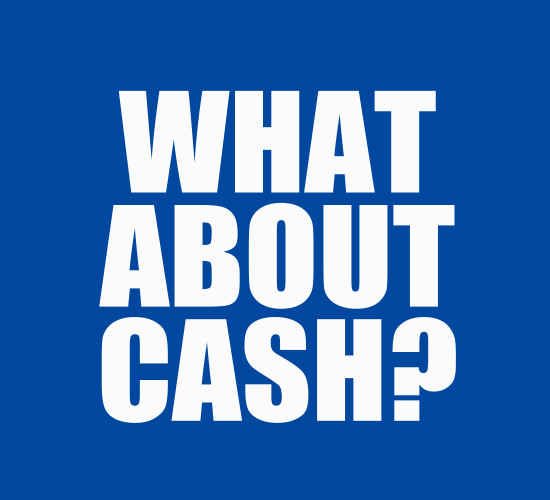Subscriber Drew contacted me awhile back with a great suggestion for an article about holding cash and the stock markets. Here’s Drew…
Hi Monty,
I’m a big fan of your concise and great advice, and I have a selfish suggestion for a column: what to do when you’re nervous about investing in the markets. I’ve been saving and essentially getting 0% return (so -3% with inflation) because I think the markets are very overbought and I want to be ready to buy during the next downturn. Timing the markets is a nearly impossible chore, and I’ve been missing out on part of this boom as a result of my caution. I’m sure there are some stock deals right now, but I’m not confident in my abilities to find them. Anyway, there may be others out there in a similar situation. Either way, thank you for the phenomenal insight and motivation!!
-Drew
I get the “cash” question a lot. By a lot, I mean it is the most frequent question I get asked by those interested in investing in the stock markets
I get it.
For most individuals, being in cash means time out of the market, which history has shown can be a costly mistake. Historically speaking, stock markets rise over the long term, so being out of the market is betting against this powerful upward trend.
The conventional wisdom is that cash is an anchor to your financial freedom ship. Its returns are low and as Drew aptly mentions, are often negative after inflation and taxes. Besides, if dollars are our freedom fighters (and they are), why do we want them sitting on the sidelines, out of the action?
It’s because cash has a hidden value. An embedded option.
You’ve heard that cash is king. That’s not entirely accurate. I like to say that cash is an Earl, a Baron, a Duke, sitting by waiting for his chance to become king.
And when does it get that chance? When the castles come crashing down.
You see, when markets crash, cash gets ordained king.
More about ordaining kings and cash’s embedded option in a moment. For now, let’s take a walk down memory lane…
We’re almost 10 years on from the last major market crash and it’s easy now to forget the importance of cash to a portfolio. The scary machinations of the Great Recession are a faded memory, especially with the market on near decade bull run and with all-time highs being made.
But it’s healthy to put things into perspective.
To that end, here’s what the Great Recession looked like regarding those who had cash and those who did not:
Highly leveraged companies (those without much cash) went bankrupt at alarming rates, either liquidating entirely or being bought for pennies on the dollar. Who was buying them? Cash rich companies, of course.
Bankers hid under their desk and literally stopped lending money except to people who didn’t need it. Such as who? Cash rich companies and cash rich people, of course.
There was blood flowing in the street. The stock market was dominated by forced sellers, “investors” who had to turn their assets into cash regardless of price. People like this were literally beating a path to those with cash. Why? So that they could desperately give away what they had in return for just a sliver of that scarce resource called… cash. Again, for pennies on the dollar.
People were going into foreclosure on their homes by the thousands, as the once-popular fantasy of your house being an ATM, turned into a nightmare that wouldn’t go away. Families were uprooted and credit scores were decimated as those who didn’t have the cash to pay their mortgage saw their American Dream go down the drain. Who was buying these homes in foreclosure? Cash rich companies and people, of course.
The reason I bring up these dark periods is for context. Given what was going on during this time (and every market crash before it), which side would you have wanted to be on, cash or no cash? Exactly.
Which brings me to some important points about investing and cash:
- The number one priority for investing is not to make the highest return, that’s the second priority. I know that may come as a complete shock to some, but it’s true. What is the number one priority in investing? It’s to not lose money. Indeed, the world’s greatest investor, Warren Buffett has said that #1 rule of investing is “to never lose money”. What he means by that, is that preservation of capital should be your number one priority. And that makes sense if you think about it. What good is trying to earn 20-30% on your investments if you put it into something risky and lose it all? For every dollar that you lose, you have to earn 100% on the next dollar just to get back to where you were. For as little as cash earns, that paltry amount will always be preferred when compared to losing your cash due to some bad investment made in haste. Can I get an amen?
- Holding cash is like holding an option–the option to take advantage of volatility in the market. The value of this option rises when market volatility rises. Thus, when the volatile stock market provides you an opportunity to buy wonderful companies at bargain prices, you’ll be ready with cash in hand to take advantage of the irrationality. Many market participants often neglect this important aspect of investing and stay fully invested at all times. For instance, many “professionals” getting paid to invest other people’s money, feel they are actually required to stay fully invested even if there’s a lack of great opportunities in the market. Thus, when the market drops, they often can’t do anything but watch (or worse, sell out near the bottom). Is it any wonder that most mutual funds (who preach being fully invested at all times), fail to beat the stock market averages?.
- The intelligent investor invests in stocks, not the stock market. There is an old adage: It is not a stock market, but a market of stocks. Successful investors like Warren Buffett focus on individual securities, not the market as a whole. Indeed, Buffett has said that the market is not there to instruct you (i.e. Inform you when to buy and sell), it’s there to serve you. Put another way, a rising market shouldn’t really inform you as to when to invest in individual stocks. What should?
- Glad you asked. The type of investing made famous by Warren Buffett is called value investing. It’s the exact type of investing I do. While this article is not the place for a course on value investing, its core principles center around the idea of buying individual stocks when your analysis tells you that those stocks are temporarily trading below their intrinsic value. This allows you to buy stocks for less than what they are truly worth, on a per-share basis. And when do they do this? Typically when there’s awful headlines about the stock relative to financial issues, operational issues and/or social issues. The idea with this type of investing is that these issues are temporary but are being blown out of proportion in the press, which is always looking for a sensational headline. People read the crazy headlines, panic and sell the stock, creating the opportunity for the value investor to buy it a discount to its real value. And what of that real value, when does a stock get back to its real value? Great question. The answer is in time. I know you probably wanted a more specific answer, but I can’t give you one. What I will do is quote Buffett on this – “in the short term the market is a voting machine. In the long term it is a weighing machine”. What Buffett is saying, is that in the short term the market can, and does, get things wrong because it’s a reflection of the market participant’s emotions at that time. The market either likes a stock or doesn’t, so it votes. Yes/no. Up/down. However, over the long term the market becomes a weighing machine, generally getting the market price of a security right, respective to its true value. Here’s a metaphor: In the Great Recession, just about everyone’s home values went down across the county. The reason they went down was primarily because the home market overall was down, not because the real value of yours or my home went down. After all, was the land, bricks, nails and wood actually worth less during the recession? Not at all. It’s just that people weren’t willing to pay more during that time because they were scared and cash was scarce. And sure enough, when the economy improved and the scary headlines ceased, home values went back to where? You guessed it, their real, intrinsic value. That’s probably enough for now on value investing. I’ll put the dentist drill away. J
- Holding cash can indirectly protect your investments by giving you the peace of mind to not sell them during inevitable bear markets or in times of need. If you have a cash reserve, you won’t feel dependent on market investments to pay for other expenses. Another advantage is that if an investment opportunity presents itself, you have the means to immediately invest. Without this, you would either be forced to sell shares of other investments, perhaps at a time when the market is down, or forgo the investment opportunity altogether. This peace of mind that cash gives you should not be underestimated. Confidence comes from peace of mind and confidence is extremely important during market crashes. It is normally not the passionate person who is rewarded in times of stock investing opportunities. Rather it’s is the dispassionate person who keeps his head, does his homework and is prepared to take advantage of the opportunity, who prevails in the market.
If you’ve made it this far, you might be wondering what is a good amount of cash to hold in your portfolio? I can’t answer that for you, or Drew or anybody. Everyone’s financial situation and investment goals are different.
The goal of this article was not to give specific investment advice about how much cash to hold or what you should do with your investments. The goal was to give you additional context for why cash is important to a portfolio, so that you can eventually make these determinations for yourself.
What I can say is that I’ve never been “all-in” in any market condition. I’ve always had dry powder ready to put to work in the future, because I knew that there would be future opportunities to invest. There always is. And while I may have missed out on some opportunities, others came right along and I was sure glad that I had the capital to invest in them.
Warren Buffett always keeps a sizeable amount of cash on hand at Berkshire Hathaway. Today that war chest is almost $100 billion. I’ve never seen Buffett invest all his cash on hand and that’s probably because he wants to be ready for the next investment opportunity. I’m always learning from Buffett and if there’s one thing I’ve learned, it’s this – there’s a time for cash and there’s a time to put it to work.
I want to applaud Drew. Several things stood out to me as very impressive in his note to me:
- He’s building investment capital.
- He realizes that timing the market is a fool’s errand.
- He’s aware that historically the best time to buy stocks is in a market downturn.
- He wants to be ready to take advantage of the next downturn.
Those steps are the fundamental building blocks of a successful investment system. But something else that Drew also mentioned really stood out – it’s that he had the humility to say that he’s not confident yet in his abilities to pick stock deals.
For that, my advice is this to Drew and you: continue to be a student of investing. Read everything you can about it and never stop studying and learning. Keep growing. You’ll make mistakes along the way, but that’s where wisdom comes from. And speaking of studying, study the masters like Warren Buffett and the type of investing style he uses, value investing. After all, success leaves tracks and why not learn the very systems that made Buffett successful? That’s exactly what I did my friends.
When you invest in this type of education, you will create a system for yourself that will help guide you as to what types of stocks to buy, when to buy and sell them, how much cash you should hold relative to your personal finances and when you should put that cash to work. You’ll create a system that will allow you to be successful in the markets and one that will allow you to become financially free.
Be free. Nothing else is worth it.
P.S. Are you missing out on what thousands are getting in their mailbox? Sign up on my email list and there will be lots of extra stuff about building wealth that you will receive in the future if you do!
P.S.S. What’s this got to do with you? If you don’t take action, absolutely nothing. But remember this – most people fail to achieve what they want in life simply because they never start. If you’re ready to escape the rat race and live life on your terms, don’t wait. Start today.
Ready for more tips on how to achieve the free life? Check-out more articles from the blog archives below:
Infographic: 10 Great Quotes From Warren Buffett To Memorize, If You Want To Win At Investing!
If You Want Financial Freedom, You’ll Regret Not Doing These Things Now








